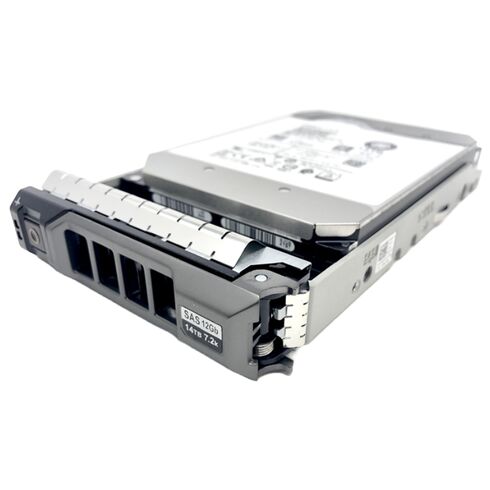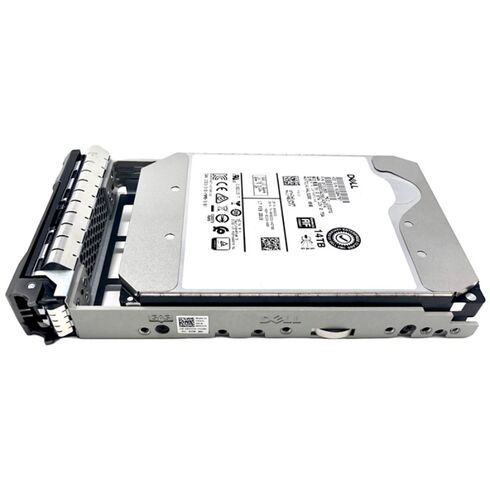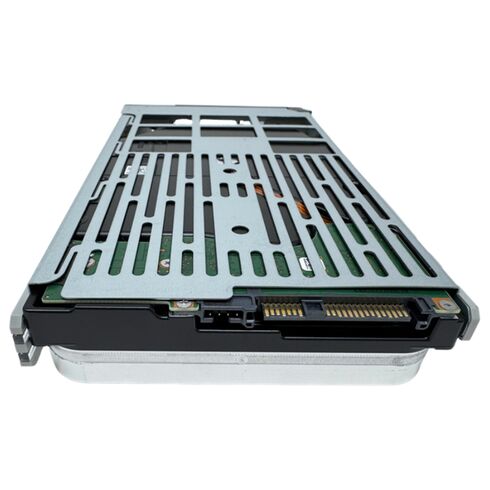400-BEIB Dell 14TB 7.2K RPM SAS-12GBPS 512MB 512E LFF Hard Disk
- — Free Ground Shipping
- — Min. 6-month Replacement Warranty
- — Genuine/Authentic Products
- — Easy Return and Exchange
- — Different Payment Methods
- — Best Price
- — We Guarantee Price Matching
- — Tax-Exempt Facilities
- — 24/7 Live Chat, Phone Support
- — Visa, MasterCard, Discover, and Amex
- — JCB, Diners Club, UnionPay
- — PayPal, ACH/Bank Transfer (11% Off)
- — Apple Pay, Amazon Pay, Google Pay
- — Buy Now, Pay Later - Affirm, Afterpay
- — GOV/EDU/Institutions PO's Accepted
- — Invoices
- — Deliver Anywhere
- — Express Delivery in the USA and Worldwide
- — Ship to -APO -FPO
- — For USA - Free Ground Shipping
- — Worldwide - from $30
Product Summary
Dell 14TB 7200RPM Near-Line SAS Hard Drive
Key Features
- Capacity: 14TB
- Form Factor: 3.5 inches
- Interface: SAS 12Gbps
- Cache Memory: 512MB
- Advanced Format: 512e
- Speed: 7200 RPM
- Includes Tray for Easy Installation
Product Specifications
General Information
- Manufacturer: Dell
- Part Number: 400-BEIB
- Type: Hard Disk Drive with Tray
Technical Details
- Storage Capacity: 14TB
- Form Factor: 3.5 inches
- Interface Speed: 12Gbps SAS
- Buffer Size: 512MB
- Rotational Speed: 7200 RPM
Performance Metrics
Speed and Efficiency
- Rotational Speed: 7200 RPM
- External Data Transfer Rate: 1200MB/s
- Cache Memory: 512MB
Connectivity Options
Interface Specifications
- Interface Type: 1 x SAS 12Gbps
- Compatible Bays: 1 x Hot-Swap - 3.5 inches
System Compatibility
Supported Server Models
- PowerEdge C6420
- PowerEdge R440
- PowerEdge R540
- PowerEdge R640
- PowerEdge R740
- PowerEdge R740xd
- PowerEdge R6415
- PowerEdge R7415
- PowerEdge R7425
Capacity
The Dell 14 TB 7.2K RPM SAS-12GBPS 512MB 512E LFF Hard Disk Hard Disk boasts an impressive storage capacity of 14 TB. This massive storage capability allows users to store an extensive amount of data, making it ideal for businesses, organizations, and individuals with high storage needs.
Benefits of a 14 TB Capacity
Having a storage capacity of 14 TB provides several benefits for users:
1. Ample Space for Data
With 14 TB of storage, users can store a vast amount of data, including documents, photos, videos, and more. This is particularly advantageous for businesses that deal with large files or need to store extensive databases. It ensures that there is enough space to accommodate all their data needs without the need for additional hard drives or storage solutions.
2. Streamlined Data Management
A high-capacity hard disk like the Dell 14 TB allows users to organize and manage their data more efficiently. With ample space available, users can create separate folders and directories for different types of files, making it easier to locate and retrieve specific information when needed.
3. Future-Proof Storage Solution
As data continues to grow exponentially, having a 14 TB capacity ensures that users have ample room to accommodate their future storage needs. It eliminates the need for frequent upgrades or additional hardware investments, providing a long-term and cost-effective solution.
4. Reduced Hardware Footprint
By opting for a high-capacity hard disk like the Dell 14 TB, users can reduce the number of physical drives required to store their data. This leads to a smaller hardware footprint, freeing up valuable space in server rooms or personal computer setups.
Importance of a 14 TB Capacity
The importance of a 14 TB capacity cannot be overstated, especially in today's data-driven world. Here are a few reasons why it is crucial for users:
1. Data Growth and Expansion
As businesses and individuals generate an increasing amount of data, having a high-capacity hard disk allows for seamless data growth and expansion. It ensures that there is enough space to accommodate new files and data without the risk of running out of storage.
2. Enhanced Productivity
With a 14 TB capacity, users can store all their important files and documents in one place. This eliminates the need to juggle multiple hard drives or external storage devices, streamlining workflows and enhancing productivity. Users can access their data quickly and efficiently without wasting time searching for files across various storage mediums.
3. Backup and Disaster Recovery
Having a large storage capacity is vital for implementing effective backup and disaster recovery strategies. Users can create regular backups of their critical data, ensuring that it is protected in the event of hardware failure or unexpected disasters. A 14 TB capacity allows for comprehensive backup solutions, providing peace of mind to users.
Speed
The Dell 14 TB 7.2K RPM SAS-12GBPS 512MB 512E LFF Hard Disk Hard Disk features a rotational speed of 7.2K RPM (revolutions per minute). This speed plays a crucial role in determining the performance and responsiveness of the hard disk.
Benefits of 7.2K RPM Speed
The 7.2K RPM speed offers several benefits to users:
1. Faster Data Access
The higher rotational speed enables faster data access times, resulting in quicker file transfers and improved overall performance. Users can retrieve their data more rapidly, reducing waiting times and enhancing productivity.
2. Enhanced System Responsiveness
The increased speed of the Dell 14 TB 7.2K RPM hard disk improves system responsiveness, especially during data-intensive tasks such as booting up the operating system or launching applications. Users will experience reduced lag and smoother operation, allowing for a more seamless computing experience.
3. Efficient Data Streaming
The 7.2K RPM speed is particularly beneficial for applications that require continuous data streaming, such as video editing or multimedia production. The faster rotational speed ensures a consistent flow of data, preventing bottlenecks and maintaining smooth playback or rendering.
Importance of 7.2K RPM Speed
The importance of the 7.2K RPM speed should not be underestimated. Here are a few reasons why it matters for users:
1. Improved Workflow Efficiency
With faster data access and system responsiveness, users can complete their tasks more efficiently. Whether it's accessing files, running applications, or performing data-intensive operations, the 7.2K RPM speed contributes to a smoother workflow and increased productivity.
2. Reduced Downtime
The higher rotational speed minimizes downtime by ensuring that data is readily available when needed. This is especially critical for businesses that rely on constant access to their data. Users can perform their tasks without interruptions caused by slow data retrieval or system lag.
3. Seamless Multitasking
The improved performance provided by the 7.2K RPM speed allows for seamless multitasking. Users can run multiple applications simultaneously without experiencing significant slowdowns or performance degradation. This is particularly beneficial for professionals who need to work with resource-intensive software or handle complex tasks concurrently.
Interface
The Dell 14 TB 7.2K RPM SAS-12GBPS 512MB 512E LFF Hard Disk Hard Disk utilizes the SAS-12GBPS (Serial Attached SCSI) interface, which offers several advantages in terms of data transfer rates and reliability.
Benefits of SAS-12GBPS Interface
The SAS-12GBPS interface provides users with a range of benefits:
1. High Data Transfer Rates
The SAS-12GBPS interface offers significantly higher data transfer rates compared to traditional SATA interfaces. This allows for faster and more efficient data transmission between the hard disk and other components of the system, resulting in improved overall performance.
2. Scalability and Flexibility
SAS interfaces provide greater scalability and flexibility compared to SATA interfaces. They allow for the connection of multiple devices using a single cable, enabling the creation of larger storage arrays or RAID configurations. This makes the Dell 14 TB hard disk suitable for use in enterprise environments or high-performance computing setups.
3. Enhanced Reliability
The SAS-12GBPS interface incorporates advanced error-checking and fault-tolerant features, ensuring the integrity and reliability of data transmission. It reduces the risk of data corruption or loss, providing users with peace of mind when it comes to storing and accessing critical information.
Importance of SAS-12GBPS Interface
The importance of the SAS-12GBPS interface lies in its ability to meet the demanding needs of modern data storage. Here's why it matters:
1. Future-Proof Connectivity
As data requirements continue to grow, having a high-speed interface like SAS-12GBPS ensures that users can keep up with evolving technology standards. It provides a future-proof connectivity option that can handle increasing data volumes without sacrificing performance.
2. Enterprise-Grade Performance
The SAS-12GBPS interface is commonly used in enterprise environments due to its superior performance and reliability. By utilizing this interface, users can experience enterprise-grade performance even in non-enterprise settings, making it an excellent choice for power users or businesses with demanding storage needs.
3. Compatibility with Existing Systems
The SAS-12GBPS interface is backward compatible with previous SAS versions and SATA interfaces. This means that users can seamlessly integrate the Dell 14 TB hard disk into their existing systems without the need for additional hardware upgrades. It offers a smooth transition and ensures compatibility with a wide range of devices.
Cache
The Dell 14 TB 7.2K RPM SAS-12GBPS 512MB 512E LFF Hard Disk Hard Disk features a cache size of 512MB. The cache plays a crucial role in enhancing the overall performance and efficiency of the hard disk.
Benefits of 512MB Cache
The 512MB cache size provides several benefits to users:
1. Faster Data Access
The cache acts as a temporary storage space for frequently accessed data, allowing for faster retrieval times. With a larger cache size, more data can be stored in the cache, resulting in quicker access to frequently used files or applications.
2. Improved Data Transfer Rates
The cache helps optimize data transfer rates by temporarily storing data that is being read from or written to the hard disk. This allows for smoother and more efficient data flow between the hard disk and other components of the system, enhancing overall performance.
3. Enhanced System Responsiveness
The larger cache size contributes to improved system responsiveness, particularly during repetitive tasks or when accessing frequently used files. Users will experience reduced latency and faster response times, resulting in a more seamless computing experience.
Importance of 512MB Cache
The importance of a 512MB cache size cannot be overlooked. Here's why it matters for users:
1. Boosted Performance
A larger cache size translates to improved performance, especially when working with data-intensive applications or performing tasks that involve frequent data access. Users can expect faster load times, smoother multitasking, and overall enhanced system performance.
2. Efficient Data Management
The cache helps optimize data management by storing frequently accessed data, reducing the need for repetitive read or write operations to the hard disk. This not only speeds up data access but also reduces wear and tear on the hard disk, prolonging its lifespan.
3. Seamless Multimedia Playback
The larger cache size is particularly beneficial for multimedia enthusiasts or professionals who work with high-definition videos or large media files. It ensures smooth playback by storing chunks of data in the cache, preventing buffering or interruptions during streaming or editing.
Form Factor
The Dell 14 TB 7.2K RPM SAS-12GBPS 512MB 512E LFF Hard Disk Hard Disk features a Large Form Factor (LFF). The form factor refers to the physical size and dimensions of the hard disk.
Benefits of LFF Form Factor
The LFF form factor offers several benefits:
1. Increased Storage Capacity
The larger physical size of LFF hard disks allows for higher storage capacities compared to smaller form factors. This means that users can enjoy greater storage space without needing to install multiple smaller hard disks.
2. Improved Airflow and Cooling
The larger form factor of LFF hard disks allows for better airflow within the system, promoting efficient cooling and heat dissipation. This is particularly important in high-performance systems where heat management is crucial for maintaining optimal performance and preventing hardware damage.
3. Easier Installation and Maintenance
The larger size of LFF hard disks makes them easier to install and maintain. The physical dimensions provide more space for cable connections, ensuring a more straightforward installation process. Additionally, the larger form factor allows for easier access to components, facilitating maintenance or upgrades when necessary.
Importance of LFF Form Factor
The LFF form factor offers several advantages that users should consider:
1. Scalability and Expandability
The larger form factor of LFF hard disks allows for scalability and expandability. Users can add more storage capacity by simply installing additional LFF hard disks without the need for complex configurations or hardware modifications. This makes it an ideal choice for businesses or individuals with growing storage needs.
2. Compatibility with Server Systems
LFF hard disks are commonly used in server systems due to their larger storage capacities and improved airflow management. By opting for an LFF form factor, users can ensure compatibility with server systems and take advantage of the benefits associated with this form factor.
3. Reliability and Durability
The larger physical size of LFF hard disks allows for the inclusion of robust components, resulting in increased reliability and durability. These hard disks are designed to handle demanding workloads and operate reliably over extended periods, making them suitable for critical applications or environments that require continuous operation.
Part Number
The Dell 14 TB 7.2K RPM SAS-12GBPS 512MB 512E LFF Hard Disk Hard Disk has the part number 400-BEIB. The part number serves as a unique identifier for the specific product model.
Benefits of Part Number 400-BEIB
The part number provides various benefits:
1. Accurate Product Identification
The part number ensures accurate identification of the Dell 14 TB hard disk model. This is particularly important when placing orders or seeking technical support. By referencing the part number, users can be confident that they are purchasing or discussing the correct product.
2. Compatibility Verification
The part number helps users verify the compatibility of the Dell 14 TB hard disk with their existing systems or infrastructure. By checking the part number against system requirements or compatibility lists, users can ensure a smooth integration of the hard disk without any compatibility issues.
3. Streamlined Inventory Management
For businesses or organizations that manage large inventories of hardware components, the part number simplifies inventory management processes. It allows for accurate tracking of specific product models, making it easier to manage stock levels, perform audits, and streamline procurement processes.
Importance of Part Number 400-BEIB
The part number 400-BEIB plays a crucial role in ensuring accuracy, compatibility, and efficient inventory management. Here's why it is important for users:
1. Seamless Product Documentation
The part number facilitates seamless product documentation by providing a unique identifier for the Dell 14 TB hard disk model. It allows users to reference the correct part number when documenting hardware configurations or creating technical specifications.
2. Efficient Technical Support
When seeking technical support or troubleshooting assistance, providing the correct part number ensures that users receive accurate guidance and solutions tailored to their specific product model. This saves time and minimizes potential misunderstandings during support interactions.
3. Simplified Procurement Processes
By referencing the part number during procurement processes, users can ensure that they are ordering the correct product and avoid potential delays or complications. The part number eliminates confusion or ambiguity, ensuring accurate and efficient procurement of the Dell 14 TB hard disk.











